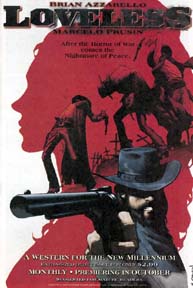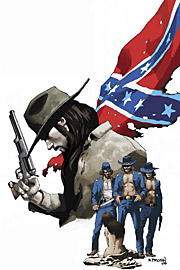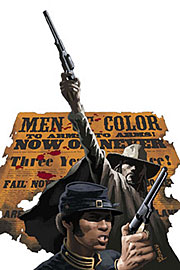
100 Bullets writer Brian Azzarello has a new series coming out. It’s a Western. It’s violent. It’s bloody. It’s dark. And it’s been a long time coming.
For reasons that I’ll never understand, it seemed at one point that the Western – the quintessential American genre – was dead. Its conventions living on – only tenuously –through samurai and science-fiction films. But times change. And now the Western is relevant again. Its themes are at the forefront of our national dialogue. Now, more than ever, the Western is necessary.
Though he’s reluctant to describe the series as a “Western,” (think instead “Bonnie & Clyde” on horseback) Brian Azzarello’s Loveless could not have come at a better time. The series’ protagonists, a husband and wife team of outlaws, are like many people today. Feed up with being marginalized. Feed up with being persecuted. And feed up with being fucked with. Only thing is, they fuck back.
I recently had had the opportunity to speak with Brian Azzarello about his new series Loveless – the first issue of which is exceptional.
Sean Fahey: Where does the title (“Loveless”) come from?
Brian Azzarello: I was thinking about calling it “Hateful,” but I wanted to be more evocative.
Sean: How did the project come about? How did it develop?
Brian: After El Diablo I really wanted to do another Western, and I just thought “God, it’s got to be an outlaw.” Historically, if you ask people to name characters from the West they’ll name four, and three of them will be outlaws. They capture the imagination…and they’re fuckin’ murderers.
Sean: But you write about murderers already. What is it about these murderers that’s different?
Brian: These murderers? With few exceptions I don’t think I’ve really written characters that like to do it…
Sean: There’s Lono.
Brian: There’s Lono. He’s probably the only character that would fit into Loveless. There’s no other character from 100 Bullets that would fit it – morally.
Sean: Wow.
Brian: Yeah.
Sean: What I immediately found interesting about this story was the setting. It’s somewhat unconventional for a Western.
Brian: It’s the part of the war that we’re not supposed to know about really. What immediately attracted me to that setting when I was doing this was what we’re going through right now – with an occupied nation. It’s very similar. The South was for all intents and purposes occupied. And the Haliburtons and Bechtels of the time were going down there and making some serious money with the government’s blessing. It was completely lawless, and what rules they had were being made up as they went along.
This was also a time when people were promised one thing and it was only delivered very, very briefly. Then it was taken back. No one was happy. The war was over, and no one was happy. Everyone was getting screwed. People were asking, “Was the war about slavery? I don’t know.” They were asking “We fought about this? But we didn’t make a change. They’re free but they’re actually in worse shape than they were before.”
 Sean: So, how topical is the story?
Sean: So, how topical is the story?
Brian: Ultimately, it’s not that topical. I’m not using this as an allegory for what’s going on in
Sean: Stepping back a bit, why a Western? What is it about the Western genre that appeals to you?
Brian: I don’t know if this is really a Western.
Sean: I’m getting to that.
(laughter)
Sean: Well, let me ask this – how would you define a Western, and what are you setting out to do with the Western?
Brian: What makes a Western a Western is the possibility of transformation. A frontier where you can reinvent yourself. The heart of a Western is a character going through a change, usually for the better. I wanted to do some characters that were going through changes for the worse. I want to make some very despicable characters compelling…which is what I’m all about anyway. (laughter)
So I’m taking more of a noir sensibility to a Western…
Sean: Similar to what you did in “El Diablo”?
Brian: Absolutely. If Johnny Double was the prelude to 100 Bullets, then El Diablo is the prelude to Loveless. El Diablo is something that I wrote that I’m pretty happy with. I think it’s a good story. And in doing it I think I tapped into something that was personally very rewarding for me. I was mixing genres in a way that I don’t know if they’ve been mixed before – and I want to do that some more.
Sean: Sticking with the “genre mixing.” When you look at the use of violence, in the crime / noir genre the protagonist generally uses violence for personal gain. Conversely, in the Western the protagonist generally uses violence as an extension or an expression of his values, of who he is. Where does “Loveless” sit?
Brian: It’s definitely more of a noir sensibility here than it is a traditional American Western sensibility. The protagonist is definitely using violence for personal gain.
Sean: What kind of journey are the characters on, thematically? What is the story you are trying to tell?
Brian: Similar to a Western they are on a quest. But their quest is to do destruction.
Sean: Why?
Brian: Because they’ve been fucked with and they want to fuck back. They’re not running way from their past, which I think is another Western convention. You know, the former outlaw putting his guns down. These people love having their guns. And they’re out for revenge.
Sean: In a situation like this, where you’ve got this blood lust if you will, do you think it happens because people just pass a point where there’s no turning back – or do you think they develop a genuine taste for it?
Brian: I think it’s both. As the series progresses, they’ll be a lot of flashbacks going on, and I think you’ll realize that these characters – Wes and Ruth – the people that they were before…are dead. They’re not these people anymore. In the flashbacks there generally shown to be loving and caring – generally good people. What we’re going to be doing in the series is showing what got them to the point where they’re at right now. Despite what one character says to Wes in the first issue, they weren’t born bad. It runs counter-intuitive to what a normal Western does in the sense that rather than show a character outrun his past, we’re going to be showing is how events from their past turned them into what they are.
 Sean: Right, I mean the series opens with them…pretty “bad.” How “dark” are these characters – and this series – going to be?
Sean: Right, I mean the series opens with them…pretty “bad.” How “dark” are these characters – and this series – going to be?
Brian: This is going to be much nastier than 100 Bullets. Oh yeah, absolutely. Both the violence and the morality. There’s a lot of regret in the characters in 100 Bullets. And there’s not a lot of regret in this thing. Things have happened in Wes’ past. He’s done bad things. But he doesn’t feel that he has anything to atone for. He thinks the town has something to atone for. It’s really dark. We’re dealing with a husband and wife that have been irretrievably scared by the war. There is no turning back for them.
Sean: Do you see Wes and Ruth’s story as tragic then, a tragic spiral downward for two otherwise good people?
Brian: Nawwww, it’s not a tragedy. ( I can actually hear him smiling wickedly as he says this) There’re tragic elements. But they don’t see it that way. It’s really operatic – but on a violent level. They revel in the harm they can bring.
Sean: Do you think that you’re taking a risk with these characters then – in the sense that people may find them difficult to sympathize with for the long haul?
Brian: I think that not taking risks with characters is a waste of my time—and the reader’s. Are they going to be hard to sympathize with? Hell no—if I do my job—which is to make their actions compelling and understandable. Even if their actions are repugnant.
Sean: What kind of character’s can we expect to see them run into?
Brian: It’s not going to be as wide open as 100 Bullets is with the supporting cast. There’s going to be four or five characters that follow them around. One of them is a bounty hunter who is a former slave. He’s a very interesting character – Atticus. He’s not a “noble savage.” A lot of popular fiction from that particular time focused on “I just want to do good.” He doesn’t want to do good. He just wants to kill white people. He’s got an axe to grind – rightfully so.
Atticus may turn out to be the character that readers most identify with. I mean, Lono is arguably the most popular character in 100 Bullets despite my best efforts.
Sean: Wes really starts this book with nothing. He was on the losing side of a war. His land has been taken. His life… it’s gone. Why do losers and defeated characters appeal to you? You see it not just here but in “100 Bullets.”
Brian: Because they have something to fight for. Simple as that.
Sean: The last time we spoke I asked you about the research you did for writing dialogue, and you mentioned that you rode around on buses, hung out in bars and race-tracks just to hear people speak. To hear the cadence. You couldn’t really do that here. What kind of research did you do to prepare writing this?
 Brian: I read a lot of autobiographies written about and written during that time. Just to sort of learn speech patterns. If I stuck too closely with it, it would be impenetrable. So I’m playing a bit looser with it. I play pretty loose with dialogue anyways, like in 100 Bullets. A lot of people say that my dialogue is very realistic. I don’t think so. I think it’s more about the way people want to talk than they do talk.
Brian: I read a lot of autobiographies written about and written during that time. Just to sort of learn speech patterns. If I stuck too closely with it, it would be impenetrable. So I’m playing a bit looser with it. I play pretty loose with dialogue anyways, like in 100 Bullets. A lot of people say that my dialogue is very realistic. I don’t think so. I think it’s more about the way people want to talk than they do talk.
Sean: But it tells something about the character.
Brian: Oh yeah. Character motivations come through in what people say. If I’m not relying on interior monologue, this is how I communicate what these people believe – through what they’re saying.
Sean: Talk about what you’re doing with the story structure here – what is it that the flashback style adds to the story you are trying to tell and what you want to do with these characters?
Brian: The structure…we’re taking a big risk with the structure…
Sean: Are you ultimately going for an angle similar to “Lost”? Flashbacks as a means of showing character development?
Brian: No, it’s something more like what Marcelo and I did in our last Hellblazer arc – “Ashes and Dust” – where the flashbacks became part of the real-time almost. You were brought into it. You were brought into what the characters experienced, rather than just have a cut to flashback. You were walking into the flashback with these characters. I’ve seen it…I just think we’re on to something interesting here with the way we’re going to handle the flashbacks.
Sean: Talk more about your collaboration with Marcelo. What does he bring to the book?
Brian: First off, the guy is a huge, huge Spaghetti Western fan. When I left Hellblazer we talked about doing something together again because we really enjoyed collaborating with each other. We talked about a lot of different things. And I mentioned to him that I was trying to get a Western off the ground, and he was like “Oh my god! Westerns are favorite stuff.” To which I said “Oh really.” (laughter) We’re both deep into the Spaghetti Westerns. For most people it begins and ends with Sergio Leone. The two of us are much more geeky about this shit. (laughter)
The other thing is Marcelo draws violence like no one else. You see it and it hurts. I think Marcelo is also very masculine in his style, and through that he implies the violence. You know it’s coming.
Sean: What do you think of the Western’s slowly emerging resurgence?
Brian: The time is right. It has been for a number of years right now. It’s in the zeitgeist. A Western is an individual forcing himself upon a society – or a lack of a society. I think recently – in the United States anyways – people’s voices aren’t being heard. And I think that’s why Westerns are becoming more popular now.
Sean: Finally, as a matter of house-keeping, I failed to mention in our last interview that it was my father that turned me on to “100 Bullets.” When the old man read the interview, he just wouldn’t let it go that I failed to mention it…
Brian: (laughter) Well turn him onto Loveless ok!
(Loveless # 1 is scheduled to be released on October 26th – click HERE to check out some preview pages)
If you have any questions or comments about this interview, you may contact Sean at scfahey@yahoo.com.